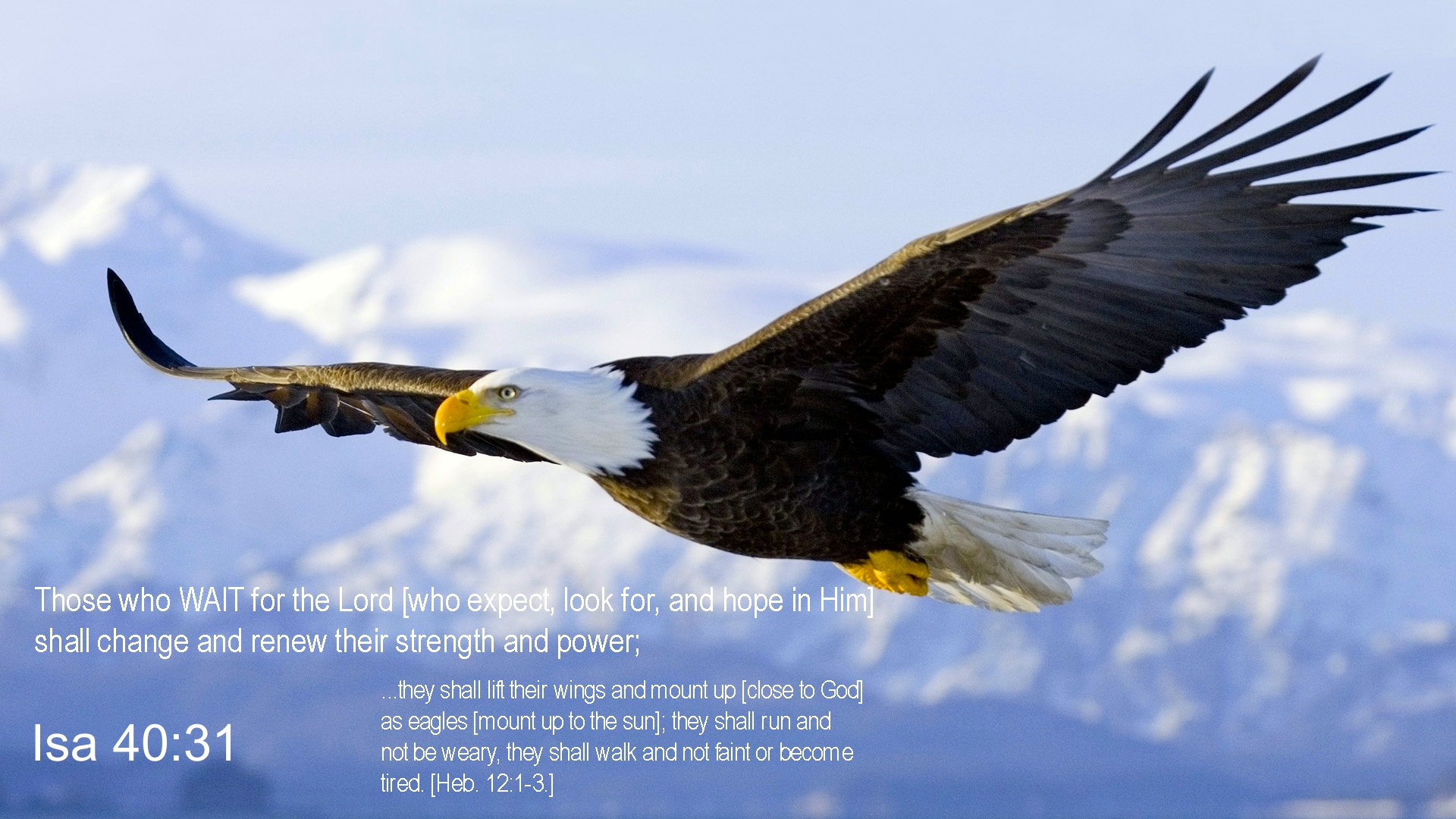
Exo 19:4 (KJV) Ye have seen what I did unto the Egyptians, and how I bare you on eagles’ wings, and brought you unto myself.
The Hebrew word translated as Eagle here is nešer, which the Complete Word Study by Spiros Zodhiates defines as:
H5404 (Word Study)
נֶשֶׁר
nešer: A masculine noun referring to an eagle. It refers to a large, carnivorous bird of prey known for its long feathers, wings, speed, power in flight, and keen eyesight (2Sa 1:23; Psa 103:5; Isa 40:31). It serves in the famous “eagles’ wings” passage as the bird on which the Lord brought Israel to Himself (Exo 19:4). The eagle represents the Lord as He hovers over His people to care for them (Deu 32:11). It was forbidden as food to Israel (Lev 11:13; Deu 14:12). It is employed figuratively as a bird of prey to represent the attack of Israel’s enemies (Deu 28:49; Job 9:26). God is the creator of the eagle (Job 39:27).
Spiros Zodhiates breaks down its characteristics as follows:
- Large in size
- Carnivorous bird of prey—or predatory. So, the eagle is not preyed upon but rather the one who is an apex predator. An apex predator, also known as a top predator or superpredator, is a predator at the top of a food chain, without natural predators of its own.
- It has long feathers, wings etc
- A bird of incredible speed,
- A birth with power in flight,
- It has keen eyesight (2Sa 1:23; Psa 103:5; Isa 40:31).
- It serves in the famous “eagles’ wings” passage as the bird on which the Lord brought Israel to Himself (Exo 19:4).
- The eagle represents the Lord as He hovers over His people to care for them (Deu 32:11).
- It was forbidden as food to Israel (Lev 11:13; Deu 14:12).
- It is employed figuratively as a bird of prey to represent the attack of Israel’s enemies (Deu 28:49; Job 9:26).
- God is the creator of the eagle (Job 39:27).
It also features in the New Testament:
Rev 4:7 (KJV) And the first beast was like a lion, and the second beast like a calf, and the third beast had a face as a man, and the fourth beast was like a flying eagle.
Rev 12:14 (KJV) And to the woman were given two wings of a great eagle, that she might fly into the wilderness, into her place, where she is nourished for a time, and times, and half a time, from the face of the serpent.
The Lord must have made the eagle’s wings special. In the Old Covenant, He states that “You have seen what I did to the Egyptians, and how I bore you on eagles’ wings and brought you to Myself” (Exo 19:4, AMPC) and in the New Covenant, He gave Israel two wings of a great eagle, that she might fly into the wilderness, into her place, where she is nourished for a period.
The Eagle also, as per scriptural testimony, apparently has the ability to renew its strength: Young lions get faint and get exhausted, but apparently, the Eagle renews its strength.
Isa 40:30-31 (KJV)
30 Even the youths shall faint and be weary, and the young men shall utterly fall:
31 But they that wait upon the LORD shall renew their strength; they shall mount up with wings as eagles; they shall run, and not be weary; and they shall walk, and not faint.
King David also confirmed this truth in one of his psalms:
Psa 103:5 (AMPC) Who satisfies your mouth [your necessity and desire at your personal age and situation] with good so that your youth, renewed, is like the eagle’s [strong, overcoming, soaring]! [Isa 40:31]
Waiting On the Lord
God compares those who wait on Him to the Eagle. The word for “wait upon the Lord” in Isa 40:31 is qâvâh and means to wait, look for, hope, expect, look eagerly for, gather (together), look, patiently, tarry, wait (for, on, upon).
“Now faith is the substance of things hoped for or expected” (Heb 11:1). “For surely there is an end; and thine expectation shall not be cut off.” (Pro 23:18, KJV). “The hope or expectation of the righteous shall be gladness” (Pro 10:28).
Spiros Zodhiates adds that to the definition of waiting on God:
Hoping, however, for what God has promised will not ultimately be disappointed, although it may not appear to succeed in the short run (Job 30:26; Isa 59:11; cf. Isa 59:15-21). The Lord will give strength to those who hope in Him (Psa 27:14 [2x]; Isa 40:31). Because He is all-powerful (Jer 14:22), He will eventually bring His promises to pass (Lam 3:25). These promises include the establishing of His kingdom on earth (Psa 37:9, Psa 37:34; Isa 25:9 [2x]). The word also means to be gathered and refers to the gathering of waters (Gen 1:9) and of people (Jer 3:17).
In the KING-dom of GOD, those who WAIT on the KING or the LORD receive the renewal of their strength, renewal of youth—and why not?
Apostle Paul wrote:
2Co 4:16 (KJV) For which cause we faint not; but though our outward man perish, yet the inward man is renewed day by day.
Col 3:10 (KJV) And have put on the new man, which is renewed in knowledge after the image of him that created him:
Rom 8:11 (KJV) But if the Spirit of him that raised up Jesus from the dead dwell in you, he that raised up Christ from the dead shall also quicken your mortal bodies by his Spirit that dwelleth in you.
To quicken means to renew, make alive or rejuvenate. The above passages state the believer can be renewed in their body, soul and spirit.
Even scientifically speaking, fasting as a way of waiting on God renews a person physically.
Another reward is they soar on wings like eagles (the prophetic or knowing the mind of GOD; seeing afar into the spirit realm); and receive the ability to run without growing weary—because they are renewed by the Spirit of the Lord, walking and not fainting—like the young lions do. This is spiritual, mental, and physical renewal and stamina to go the long haul—doing the bidding of the LORD. These are a few benefits of waiting on the Lord.





